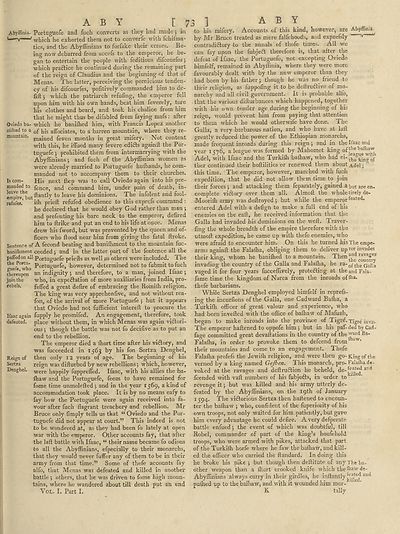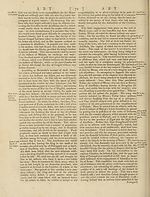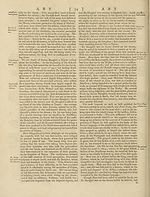Encyclopaedia Britannica, or, a Dictionary of arts, sciences, and miscellaneous literature : enlarged and improved. Illustrated with nearly six hundred engravings > Volume 1, A-AME
(91) Page 73
Download files
Complete book:
Individual page:
Thumbnail gallery: Grid view | List view

A B Y [ 7
Abyflinia. Portuguefe and fuch converts as they had made; in
^ ' which he exhorted them not to converfe with fchiima-
tics, and the Abyffinians to forfake their errors. Be¬
ing now debarred from accefs to the emperor, he be¬
gan to entertain the people with feditious difcourfes j
which pradtice he continued during the remaining part
of the reign of Claudius and the beginning of that of
Menas. The latter, perceiving the pernicious tenden¬
cy of his difcourfes, pofitively commanded him to de-
fift j which the patriarch refufing, the emperor fell
upon him with his own hands, beat him feverely, tore
his clothes and beard, and took his chalice from him
that he might thus be difabled from faying mafs: after
Oviedo ba- which he banilhed him, with Francis Lopez another
niihed to a 0f aflfociates, to a barren mountain, where they re-
mountain. majnec[ feven months in great mifery. Not content
with this, he iffued many fevere edidls againft the Por¬
tuguefe ; prohibited them from intermarrying with the
Abyflinians; and fuch of the Abyflinian women as
were already married to Portuguefe hulbands, he com¬
manded not to accompany them to their churches.
Is com- His next ftep was to call Oviedo again into his pre-
manded to fence> and command him, under pain of death, in-
empire but flan^y leave his dominions. The infolent and fool-
refufcs.’ ilh prieft refufed obedience to this exprefs command :
he declared that he would obey God rather than man j
and prefenting his bare neck to the emperor, defired
him to ftrike and put an end to his life at once. Menas
drew his fword, but was prevented by the queen and of¬
ficers who flood near him from giving the fatal ftroke.
Sentence of A fecond beating and banilhment to the mountain fuc-
banifliment ceeded; and in the latter part of the fentence all the
paired on ^ Portuguefe priefts as well as others were included. The
thefe°who P°rt;ugue^e> however, determined not to fubmit to fuch
thereupon an indignity $ and therefore, to a man, joined Ifaac j
join the who, in expeftation of more auxiliaries from India, pro¬
rebels. feffed a great defire of embracing the Romilh religion.
The king was very apprehenfive, and not without rea-
fon, of the arrival of more Portuguefe ; but it appears
that Oviedo had not fufficient intereft to procure the
Ifaac again fupply he promifed. An engagement, therefore, took
defeated, place without them, in which Menas was again vidlori-
ous; though the battle was not fo decifive as to put an
end to the rebellion.
The emperor died a fliort time after his victory, and
was fucceeded in 1563 by his fon Sertza Denghel,
then only 12 years of age. The beginning of his
reign was difturbed by new rebellions j which, however,
were happily (upprefied. Ifaac, with his allies the ba-
fliaw and the Portuguefe, feem to have remained for
fome time unmolefted ; and in the year 1569, a kind of
accommodation took place. It is by no means eafy to
fay how the Portuguefe were again received into fa¬
vour after fuch flagrant treachery and rebellion. Mr
Bruce only Amply tells us that “ Oviedo and the Por¬
tuguefe did not appear at court.” This indeed is not
to be wondered at, as they had been fo lately at open
war with the emperor. Other accounts fay, that after
the laft battle with Ifaac, “ their name became fo odious
to all the Abyflinians, efpecially to their monarchs,
that they would never fuffer any of them to be in their
army from that time.” Some of thefe accounts fay
alfo, that Menas was defeated and killed in another:
battle; others, that he was driven to fome high moun¬
tains, where he wandered about till death put an end
Vol. I. Part I.
Reign of
Sertza
Denghel.
3 ] A B Y
to bis mifery. Accounts of this kind, however, are Abyffima
by Mr Bruce treated as mere falfehoods, and exprefsly ^
contradiftory to the annals of thofe times. All we
can fay upon the fubjeft therefore is, that alter the
defeat of Ifaac, the Portuguefe, not excepting Oviedo
himfelf, remained in Abyflinia, where they were more
favourably dealt with by the new emperor than they
had been by his father j though he was no friend to
their religion, as fuppofing it to be deftruftive of mo¬
narchy and all civil government. It is probable alfo,
that tlie various difturbances which happened, together
with his own tender age during the beginning of his
reign, Avould prevent him from paying that attention
to them which he would otherwife have done. The
Galla, a very barbarous nation, and who have at laft
greatly reduced the power of the Ethiopian monarchs,
made frequent inroads during this reign ; and in the Ifaac and
year 1576, a league was formed by Mahomet king of f1'6 baflia.^
Adel, with Ifaac and the Turkilh balhaw, who had ei- ^Jing of
ther continued their hoftilities or renewed them about Adel; °
this time. The emperor, however, marched with fuch
expedition, that he did not allow them time to join
their forces j and attacking them feparately, gained abut are en-
complete vi&ory over them all. Almoft the wholetirelyde-
Mooriflr army was deftroyed ; but while the emperorfeated*
entered Adel with a defign to make a full end of his
enemies on the eaft, he received information that the
Galla had invaded his dominions on the weft. Iraver-
fing the whole breadth of the empire therefore with the
utmoft expedition, he came up with thefe enemies, who
were afraid to encounter him. On this he turned hisTlie empe-
arms againft the Falaftia, obliging them to deliver up ror invades
their king, whom he baniftied to a mountain. Then
invading the country of the Galla and Falaftia, he ra-0fthe Galla
vaged it for four years fucceflively, protetting at theandFala-
fame time the kingdom of Narea from the inroads of flia.
thefe barbarians.
While Sertza Denghel employed himfelf in reprefs-
ing the incurfions of the Galla, one Cad ward Balha, a
Turkifti officer of great valour and experience, who
had been invefted with the office of bafliaw of Mafuah,
began to make inroads into the province of Tigre. Tigre inva'-
The emperor haftened to oppofe him ; but in his paf-ded by Cad-,
fage committed great devaftations in the country of the ward £a*
Falalha, in order to provoke them to defcend from “w*
their mountains and come to an engagement. T. hefe
Falaftia profefs the Jewifli religion, and wrere then go-King of the
verned by a king named Gefhen. This monarch, pro-Falaflia de.
voked at the ravages and deftru&ion he beheld, de-ari<l
fcended with vaft numbers of his fubje£ts, in order to u
revenge it; but was killed and his army utterly de¬
feated by the Abyflinians, on the 19th of January
1594. The victorious Sertza then haftened to encoun¬
ter the baftiaw ; who, confident of the fuperiority of his
own troops, not only waited for him patiently, but gave
him every advantage he could defire. A very defperate.
battle enfued; the event of which was doubtful, till
Robel, commander of part of the king’s houfehold
troops, who were armed with pikes, attacked that part
of the Turkifti horfe where he faw the bafliaw, and kill¬
ed the officer who carried the ftandard. In doing this
he broke his pike \ but though then deftitute of any The ba-
other weapon than a ftiort crooked knife which the^iawde-^
Abyflinians always carry in their girdles, he inftantly a,Ki
puihed up to the bafliaw, and with it wounded him mor- '
K tally
Abyflinia. Portuguefe and fuch converts as they had made; in
^ ' which he exhorted them not to converfe with fchiima-
tics, and the Abyffinians to forfake their errors. Be¬
ing now debarred from accefs to the emperor, he be¬
gan to entertain the people with feditious difcourfes j
which pradtice he continued during the remaining part
of the reign of Claudius and the beginning of that of
Menas. The latter, perceiving the pernicious tenden¬
cy of his difcourfes, pofitively commanded him to de-
fift j which the patriarch refufing, the emperor fell
upon him with his own hands, beat him feverely, tore
his clothes and beard, and took his chalice from him
that he might thus be difabled from faying mafs: after
Oviedo ba- which he banilhed him, with Francis Lopez another
niihed to a 0f aflfociates, to a barren mountain, where they re-
mountain. majnec[ feven months in great mifery. Not content
with this, he iffued many fevere edidls againft the Por¬
tuguefe ; prohibited them from intermarrying with the
Abyflinians; and fuch of the Abyflinian women as
were already married to Portuguefe hulbands, he com¬
manded not to accompany them to their churches.
Is com- His next ftep was to call Oviedo again into his pre-
manded to fence> and command him, under pain of death, in-
empire but flan^y leave his dominions. The infolent and fool-
refufcs.’ ilh prieft refufed obedience to this exprefs command :
he declared that he would obey God rather than man j
and prefenting his bare neck to the emperor, defired
him to ftrike and put an end to his life at once. Menas
drew his fword, but was prevented by the queen and of¬
ficers who flood near him from giving the fatal ftroke.
Sentence of A fecond beating and banilhment to the mountain fuc-
banifliment ceeded; and in the latter part of the fentence all the
paired on ^ Portuguefe priefts as well as others were included. The
thefe°who P°rt;ugue^e> however, determined not to fubmit to fuch
thereupon an indignity $ and therefore, to a man, joined Ifaac j
join the who, in expeftation of more auxiliaries from India, pro¬
rebels. feffed a great defire of embracing the Romilh religion.
The king was very apprehenfive, and not without rea-
fon, of the arrival of more Portuguefe ; but it appears
that Oviedo had not fufficient intereft to procure the
Ifaac again fupply he promifed. An engagement, therefore, took
defeated, place without them, in which Menas was again vidlori-
ous; though the battle was not fo decifive as to put an
end to the rebellion.
The emperor died a fliort time after his victory, and
was fucceeded in 1563 by his fon Sertza Denghel,
then only 12 years of age. The beginning of his
reign was difturbed by new rebellions j which, however,
were happily (upprefied. Ifaac, with his allies the ba-
fliaw and the Portuguefe, feem to have remained for
fome time unmolefted ; and in the year 1569, a kind of
accommodation took place. It is by no means eafy to
fay how the Portuguefe were again received into fa¬
vour after fuch flagrant treachery and rebellion. Mr
Bruce only Amply tells us that “ Oviedo and the Por¬
tuguefe did not appear at court.” This indeed is not
to be wondered at, as they had been fo lately at open
war with the emperor. Other accounts fay, that after
the laft battle with Ifaac, “ their name became fo odious
to all the Abyflinians, efpecially to their monarchs,
that they would never fuffer any of them to be in their
army from that time.” Some of thefe accounts fay
alfo, that Menas was defeated and killed in another:
battle; others, that he was driven to fome high moun¬
tains, where he wandered about till death put an end
Vol. I. Part I.
Reign of
Sertza
Denghel.
3 ] A B Y
to bis mifery. Accounts of this kind, however, are Abyffima
by Mr Bruce treated as mere falfehoods, and exprefsly ^
contradiftory to the annals of thofe times. All we
can fay upon the fubjeft therefore is, that alter the
defeat of Ifaac, the Portuguefe, not excepting Oviedo
himfelf, remained in Abyflinia, where they were more
favourably dealt with by the new emperor than they
had been by his father j though he was no friend to
their religion, as fuppofing it to be deftruftive of mo¬
narchy and all civil government. It is probable alfo,
that tlie various difturbances which happened, together
with his own tender age during the beginning of his
reign, Avould prevent him from paying that attention
to them which he would otherwife have done. The
Galla, a very barbarous nation, and who have at laft
greatly reduced the power of the Ethiopian monarchs,
made frequent inroads during this reign ; and in the Ifaac and
year 1576, a league was formed by Mahomet king of f1'6 baflia.^
Adel, with Ifaac and the Turkilh balhaw, who had ei- ^Jing of
ther continued their hoftilities or renewed them about Adel; °
this time. The emperor, however, marched with fuch
expedition, that he did not allow them time to join
their forces j and attacking them feparately, gained abut are en-
complete vi&ory over them all. Almoft the wholetirelyde-
Mooriflr army was deftroyed ; but while the emperorfeated*
entered Adel with a defign to make a full end of his
enemies on the eaft, he received information that the
Galla had invaded his dominions on the weft. Iraver-
fing the whole breadth of the empire therefore with the
utmoft expedition, he came up with thefe enemies, who
were afraid to encounter him. On this he turned hisTlie empe-
arms againft the Falaftia, obliging them to deliver up ror invades
their king, whom he baniftied to a mountain. Then
invading the country of the Galla and Falaftia, he ra-0fthe Galla
vaged it for four years fucceflively, protetting at theandFala-
fame time the kingdom of Narea from the inroads of flia.
thefe barbarians.
While Sertza Denghel employed himfelf in reprefs-
ing the incurfions of the Galla, one Cad ward Balha, a
Turkifti officer of great valour and experience, who
had been invefted with the office of bafliaw of Mafuah,
began to make inroads into the province of Tigre. Tigre inva'-
The emperor haftened to oppofe him ; but in his paf-ded by Cad-,
fage committed great devaftations in the country of the ward £a*
Falalha, in order to provoke them to defcend from “w*
their mountains and come to an engagement. T. hefe
Falaftia profefs the Jewifli religion, and wrere then go-King of the
verned by a king named Gefhen. This monarch, pro-Falaflia de.
voked at the ravages and deftru&ion he beheld, de-ari<l
fcended with vaft numbers of his fubje£ts, in order to u
revenge it; but was killed and his army utterly de¬
feated by the Abyflinians, on the 19th of January
1594. The victorious Sertza then haftened to encoun¬
ter the baftiaw ; who, confident of the fuperiority of his
own troops, not only waited for him patiently, but gave
him every advantage he could defire. A very defperate.
battle enfued; the event of which was doubtful, till
Robel, commander of part of the king’s houfehold
troops, who were armed with pikes, attacked that part
of the Turkifti horfe where he faw the bafliaw, and kill¬
ed the officer who carried the ftandard. In doing this
he broke his pike \ but though then deftitute of any The ba-
other weapon than a ftiort crooked knife which the^iawde-^
Abyflinians always carry in their girdles, he inftantly a,Ki
puihed up to the bafliaw, and with it wounded him mor- '
K tally
Set display mode to:
![]() Universal Viewer |
Universal Viewer | ![]() Mirador |
Large image | Transcription
Mirador |
Large image | Transcription
Images and transcriptions on this page, including medium image downloads, may be used under the Creative Commons Attribution 4.0 International Licence unless otherwise stated. ![]()
| Permanent URL | https://digital.nls.uk/193133168 |
|---|
| Attribution and copyright: |
|
|---|
| Description | Ten editions of 'Encyclopaedia Britannica', issued from 1768-1903, in 231 volumes. Originally issued in 100 weekly parts (3 volumes) between 1768 and 1771 by publishers: Colin Macfarquhar and Andrew Bell (Edinburgh); editor: William Smellie: engraver: Andrew Bell. Expanded editions in the 19th century featured more volumes and contributions from leading experts in their fields. Managed and published in Edinburgh up to the 9th edition (25 volumes, from 1875-1889); the 10th edition (1902-1903) re-issued the 9th edition, with 11 supplementary volumes. |
|---|---|
| Additional NLS resources: |
|

